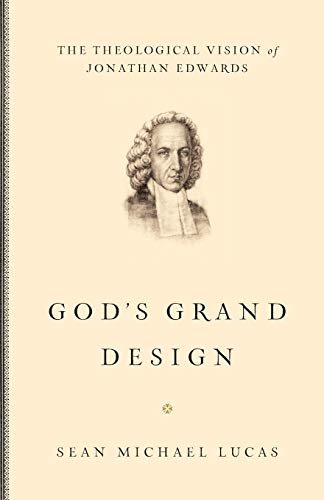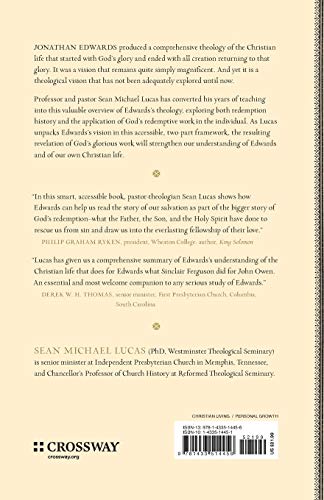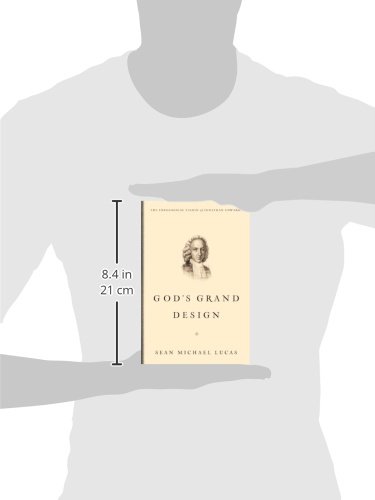



God's Grand Design: The Theological Vision of Jonathan Edwards
D**E
Remembering America's Greatest Intellectual
For twenty-five years, I have read and re-read books by Jonathan Edwards and about Jonathan1433514451_b Edwards. The books about Jonathan Edwards are weighty and worthwhile. Some Edwardsian quotes seem to appear in nearly every volume. For instance, "Absolute sovereignty is what I love to ascribe to God." Or, "True religion, in great part, consists in holy affections." These Puritan treasures never wear out, get old, or bore this reader. Rather, they only magnify the supreme value of reading old books, especially books by and about Jonathan Edwards. Sean Michael Lucas' work, God's Grand Design is no exception.Lucas sets out to unpack the theological vision of Jonathan Edwards in this moderately sized work.Part One: Redemption HistoryPart one explores Redemption History which begins most fittingly with a discussion on the glory of God, arguably the Puritan divine's favorite topic. Lucas notes, "Far from focusing on a merely individual salvation, Edwards rooted his understanding of the Christian life in the cosmic purpose of God himself - namely, for God to glorify himself and enjoy himself forever." The author does a notable job at nailing the high points and accurately reflects the theology of Jonathan Edwards. He writes with great lucidity and provides ample citations from primary resources.Part Two: Redemption AppliedPart two is an excellent overview of Edward's view on religious affections, virtue, and the means of grace. The author caps off his discussion with Edward's vision of the Christian life - a life that is compared to a journey heavenward. He explores Edward's passion for living and dying well - all to the glory of God. Built into his discussion is Edward's pastoral goal to help his flock arrive to heaven safely. Edwards notes, "It is sweet to the soul to love Christ. It is an holy affection that fills the soul with sweetness. And then you will have the pleasure of living a life of communion with Christ, which will be a very sweet life." . Indeed, his passion was to help Christ-followers live with all their hearts to the glory of God.God's Grand Design captures the vision of Jonathan Edwards faithfully and joyfully. It is a welcome friend to first time readers and a solid reminder for long time admirers of America's greatest intellectual.
S**E
Deep dive
Edwards is amazing.
W**E
A fair read
Seems largely outdated for our time. Thought it would get in to an interesting dialogue on theology, but is not what I expected.
R**M
One of the best books ever
A strong recount of Jonathan Edwards' works. Totally recommend.
S**3
A Vision for God's Glory
Rev. Sean Michael Lucas, pastor of First Presbyterian Church of Hattiesburg, Mississippi has written a timely, well-researched and edifying book on New England's greatest theologian, Jonathan Edwards. Before I go on, I must divulge that I cut my teeth on the work of Jonathan Edwards in Lucas' class at seminary (Edwards was not an easy read then, nor is he now). Yet, the vision that Lucas casts concerning the life and work of Edwards is full in scope and touches upon both the life, ministry, and vision of Edwards. Reminiscent of John Murray's book title, Lucas' book is divided into two sections, the first being on redemption history (Edwards' biblical theology from creation to consummation), and the second is Redemption Applied (how does the fact of God's sovereign glory and grace through redemption apply to the workings and lives of the church and its people). Instead of a dry, arid and scholastic work, Lucas displays the essential elements of Edwards theological vision (reflection of God's glory back to himself, 40, and the great care Edwards takes to impart to his people an experiential grace of finding fullness in Christ).One surprising note that came across in reading the book was regarding Edwards' view of creation. In chapter two, Lucas writes, "The most striking thing about Jonathan Edwards's sermon series "A History of the Work of Redemption" is that in his desire to present "divinity in an entire new method" ...he slighted the importance of God's work of creation" (35). Lucas goes on to quote Edwards again saying that "All other works of providence may be looked upon as appendages to this great work (the work of redemption" (36). Creation points to the point of redemption, yet it is not to be displayed as preeminent in importance. Lucas does not mean to state that creation was insignificant for Edwards, but rather it was secondary to the great work of redemption. Lucas is careful to point out the connection between the fall, original sin, and creation. Racked with guilt, sin, and the consequences of the fall, creation as a whole as a turned inward on itself, gratifiying the desires of the sinful nature. This leaving creation to secondary importance for Edward is striking all the more since we find creation and its aims given great weight through various Reformed strands of thought (Bavinck, Kuyper, Cornelius Plantinga, etc.).One of my favorite sections of the book was the chapter on the The Christian Life as a Journey to Heaven. In this chapter, we find Lucas pulling together the thought of Edwards on the four stage of life. On one occasion as Edwards recounts in his Faithful Narrative, "four year old Phebe Bartlet..was moved by witness of another to engage in earnest prayer, desire to enjoy God, and long to serve him and gain an interest in him" (176). The change of life for Phebe was met with the witness of her older brother and the mighty preaching of Edwards. Edwards began to commit himself to hold meetings designed to call these children to Christ, to love him more than all else (including their parents) (177). What Lucas brings out is Edwards' commitment to instruct and care for these young children at all costs, because he believed that in order for people to continue in godliness, the best age to instruct them is early on. Edwards was careful to not only instruct about the primary importance of Christ, but also warn young people about the dangerous desires of the flesh. Lastly, Edwards carefully sought to help his people die well. Reminding me of Martin Luther's work on the same subject, Edwards said "when the life of a saint is at an end and they depart into another world, their works do follow them...There they shall reap the sweet fruit of them" (187). Looking heavenward in expectation, Edwards was able to be a source of great comfort for those struggling with the end of life.Overall, this book was a great window into the vision of Jonathan Edwards, not only for the Bible, but for the daily concerns of his people in Northampton. In the end, though, this book extols the glory of God in the work of Edwards, not as bi-product of minstry but as the heart and soul of everything he did. I came away from reading this book with a greater vision for God's glory and a more zealous heart for Christ. My hope is that many others will see this book and delight to see God's glory more fully through the vision of Edwards.Thanks to Crossway for the review copy of this work.
P**W
Another good Edwards book
There are many great books on Edwards at the moment. This is one that is well worth having. It seeks, if I understand Lucas right, to understand Edwards's theology through the prism of the history of God's redemption. In doing so he sets a clear and coherent vision of Edwards's theological insights.
E**.
Edwards' Vision that should be Ours
A superb book setting out the breadth of Edwards' vision.An excellent read.Highly recommended.
Trustpilot
1 day ago
5 days ago